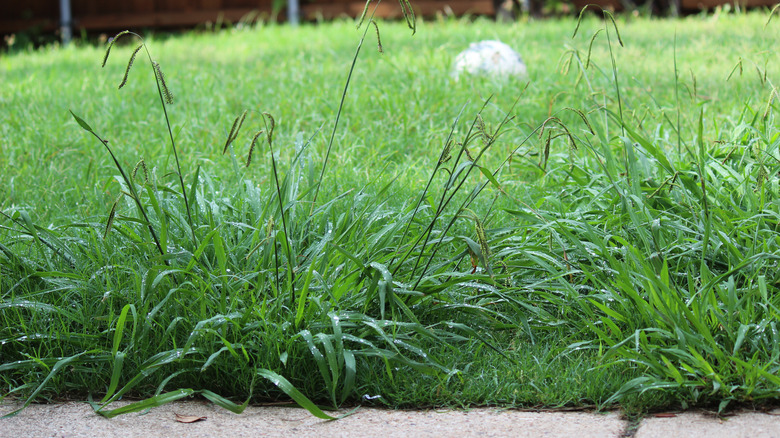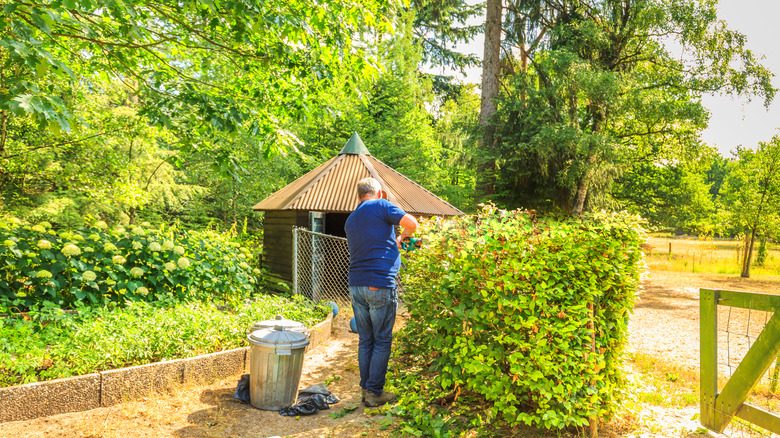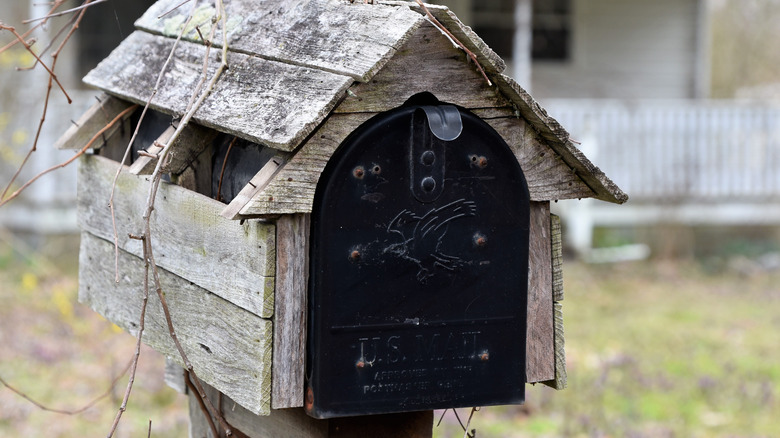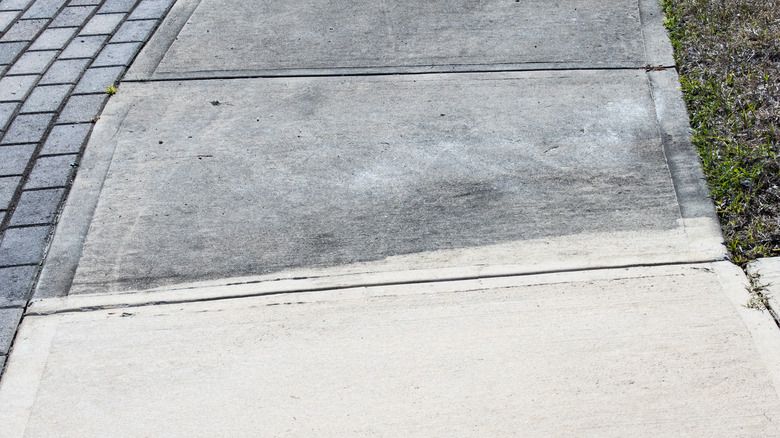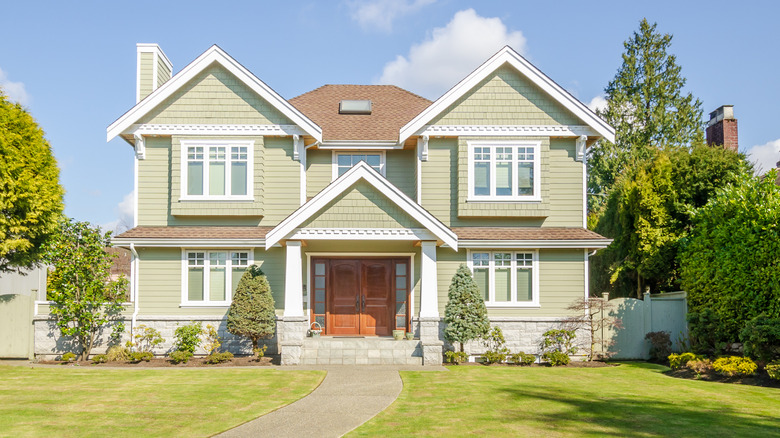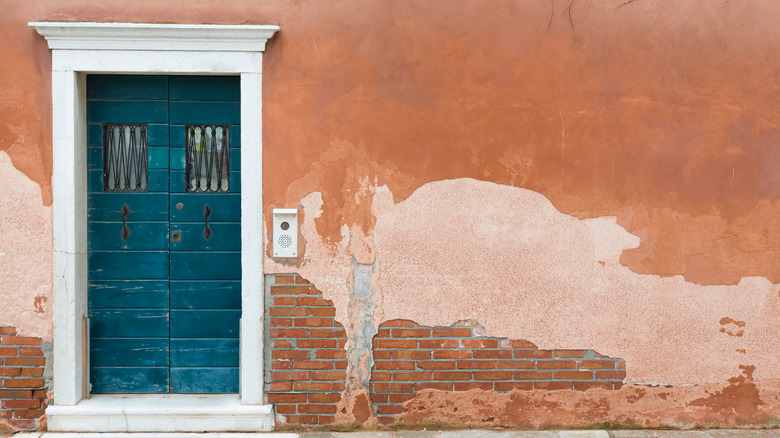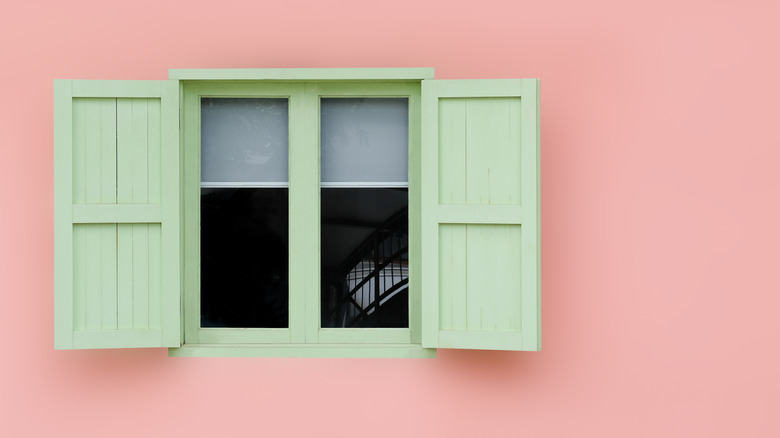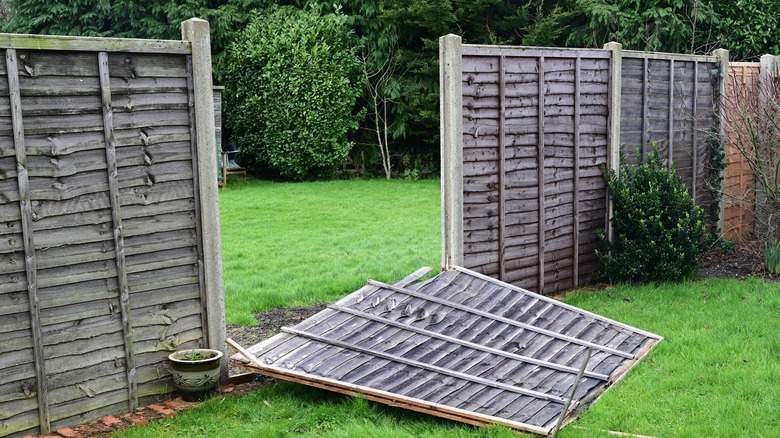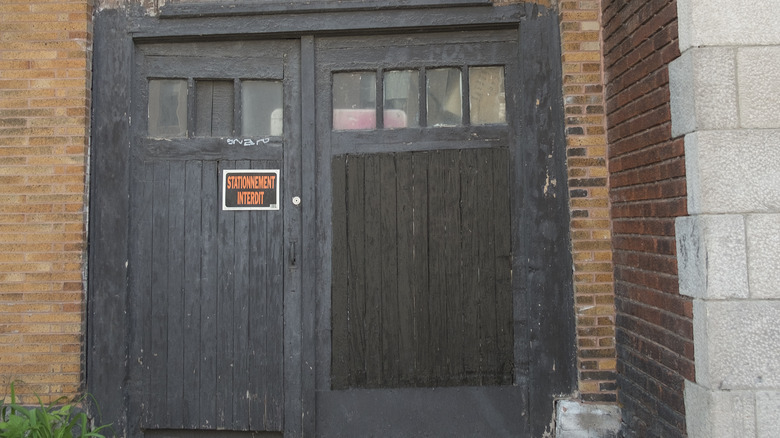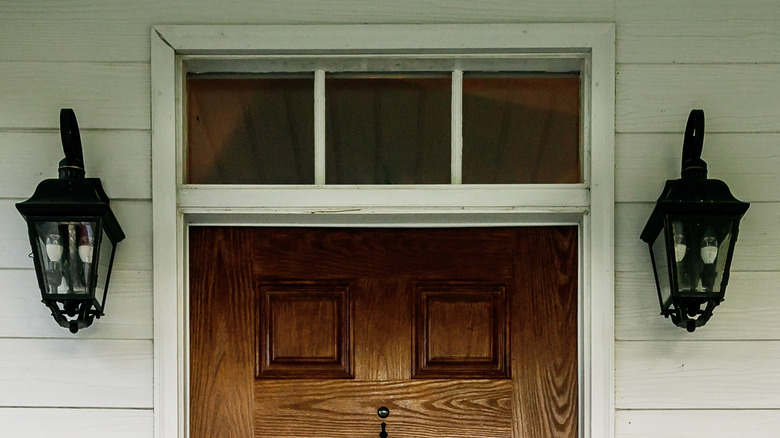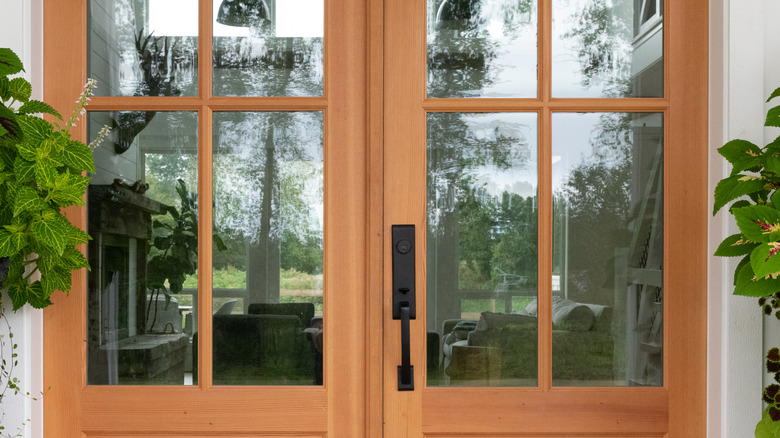Curb Appeal Mistakes That Will Hurt Your Chances Of Selling Your Home
Curb appeal explains how your house appears at first glance. According to Investopedia, it's a phrase people use to talk about the general presentation of your home. If you have good curb appeal, your home looks nice, well-kept, and welcoming from the street. If you don't, it's a possibility your place could be the neighborhood eyesore.
When it comes time to sell your house, curb appeal is very important. The selling process is essentially a long advertising campaign. You are trying to convince members of the public that your house is worth purchasing above all others on the market. So, if you are making any mistakes, it could really be hurting your chances of making a sale — or, at least getting your money's worth out of it. Luckily, most of these blunders are not too expensive to fix, in fact, you typically don't even need to hire a professional to set them right. Make sure your home gives the absolute best first impression by avoiding these common curb appeal mistakes.
An overgrown lawn
If your lawn is dead, full of weeds, or tickles your knees and not just your toes, it's a huge curb appeal mistake. An overgrown lawn is just plain ugly and will keep buyers away. In fact, many buyers may assume that a well-kept lawn is one of the first, and most obvious, things a seller can do to prepare for house showings. Imagine, you are on your way to see a home you are interested in. You pull up and the yard is the mess. It would be natural to assume that if they can't even take care of the lawn, there's no telling what the inside of the house will look like. This might prevent you from checking out the property all together! Whether you're the buyer or the seller, that's definitely not a favorable scenario.
According to Hillsborough Irrigation & Landscape Services, a messy lawn can be overwhelming, but there is a sure-fire strategy to cleaning it up: start in the middle and work your way out. The first step is to pick up things that are strewn about and put them aside to be disposed of. This could be dead tree branches, litter, a rusty bicycle — you get the picture. From there, rake up the dead leaves and smaller sticks. After taking a break (you're working hard!), remove all dead plants and trim up the ones you want to keep. Finally, mow, fertilize, and water the lawn.
Dead flowers
Whether they are in a vase or out front in your garden, having dead flowers visible to potential buyers will hurt your chances of a quick sale. According to Watters Garden Center, the flowers we plant can die for a variety of reasons. The most common reason is that we are too rough when we transfer them from pot to pot, or from pot to soil in the ground. By doing this, we cause irreparable harm to their stems and pave the way for pests and fungi to take over. Other times, we simply plant them in the wrong spot in our yard and they shrivel in the shade or bake in the sun. So, when reviving your flowerbeds, pay attention to these things.
If you have a vase of flowers on your kitchen table that's starting to wilt, and you don't want to buy a whole new bouquet for your last showing of the day, all hope is not lost — there are ways you can revive them. If any part of the bouquet is well and truly dead, trim it back. For the remainder of it, simply give the stems a fresh cut and place a little bit of sugar in the water to perk things up. (via Bouqs)
Crowded landscaping
If buyers think your yard looks like too much work to maintain, they might not be as interested in taking it on themselves. Therefore, if you have an intricate garden, or lots of landscaping, it might be time to make some changes in preparation for moving. According to Morning Chores, an overcrowded garden generally does not thrive. Although there are some exceptions to this rule, like placing plants that attract pollinators close to your vegetable garden to encourage growth. But, if you have boxes and boxes of basil, a rose arch, a few styled hedges, and a banana tree all crammed into one yard, buyers might take one look at things and think, "no way."
The key, unfortunately, is to get rid of some of your plants. Don't worry, moving plants doesn't have to kill them, as they can simply find a new home. Consider giving a few flowers to a friend, or starting off your sibling with a vegetable garden. As horrible as it sounds, crowded landscaping looks like clutter to some, so you need to reduce the visual impact (even if it's perfectly manicured!) to get a few bites.
A rundown mailbox
Having a chic, secure mailbox is essential to attract buyers, given that we use the mail to move sensitive information. As WH Security points out, it is a federal crime to steal or tamper with another person's mail. Unfortunately, it is a relatively easy crime to commit, as most standard mailboxes do not come with locks. In addition, a mail slot on your front door can pose risks as well, because potential intruders can use it as easy access. However, you can mitigate both of these risks with simple measures like a security camera, collecting your mail on time, or installing a collection box on the side of the slot.
No matter how you collect your mail, a rundown, rusty mailbox is an eyesore. If the wood on the base of your mailbox is rotting or leaning to the side, buyers will think you don't take care of your house. It's the same if you have a brick base that's chipped or has parts missing. Before placing your home on the market, take the time to spruce up your mailbox to increase your home's overall curb appeal.
Dirty sidewalks and driveway
Sometimes, sidewalk maintenance is the responsibility of the city or county. However, this usually only applies to things like uneven pathways or missing chunks of concrete. If your sidewalks and driveway are covered with grime when you are trying to sell, then it is most likely your responsibility to clean them off. By pressure washing, you can make sure your home looks attractive to buyers.
According to Perfect Power Wash, regularly cleaning your house and the areas surrounding it can prevent more problems from popping up in the future. You can destroy things, like mold, that act as irritants and negatively impact your health. Getting rid of grime also prepares your home for other projects, like painting and gardening. Paint won't adhere to a dirty surface, and the high-powered stream of water can easily wash away weeds popping up in sidewalk cracks. It is easy to rent a power washer from a local home improvement store, like the Home Depot or Lowe's, if you do not want to purchase one of your own.
No visible street numbers
If your house is hard to find, it is very easy for buyers to get annoyed. Even with the magic of a smartphone's GPS, it's very common to be told "you've arrived at your destination," and still not be sure you're in the right place. This is especially true if the house in question doesn't have clearly visible numbers, leaving you to guess which property is which. Sometimes, the city or county might paint house numbers on the curb, but you can't always see those if someone is parked right out front. If buyers arrive at the open house frustrated, it's less likely they'll put in an offer. Small things like this can really add up.
According to Jay Modglin, the benefits of having clearly marked street numbers extend well beyond the open house, as they can help emergency services locate you faster in a time of need. Be sure that your numbers are large and in an easy-to-see location, like on the wall of your porch or just above the door frame. They should be positioned so that the light from the front porch illuminates them in the evenings, or make sure to provide them with their own light source. It's also a good idea to have your street number on your mailbox, so there is no doubt.
Personalized lawn ornaments
According to Organise My House, decluttering and depersonalizing your home is one of the key elements to selling your house. You need to remove as much of your personal taste from your home as possible. This also includes clearing away all of your personal items from the lawn. Think of it this way: if an item can help the buyer to envision themselves in the space, it can stay. This could be things like a nice garden bench, or maybe even a bird bath. Items like this give a great impression of how a space could be used.
However, more unique items, like a children's playhouse, should be removed. Same goes from any lawn flamingos, and yes, even garden gnomes. Things that we might think are fun and endearing can unfortunately elicit an eye roll or two from potential buyers. The nice thing is, if you're planning to take these items with you to your new home, you've already begun the packing process. And if you're not bringing them with you, then now is as good a time as ever to get rid of them.
Faded exterior paint
If your home's paint is faded or peeling, spruce it up before you try to sell it. Nothing screams, "this house is falling apart at the seams," like seeing a terrible paint job as soon as you step out of your car for the showing. According to CertaPro Painters, you should be able to tell when to repaint your house long before it's time to sell it. Signs of wear and tear include faded and peeling paint, as well as cracking and even bubbling. If you find your paint is starting to bubble, it means that moisture has gotten underneath the paint layer and it won't be long before it begins to peel.
Another thing to keep an eye out for is gaps around your windows and doors. If things are pulling and peeling around hinges, you will need to touch up these areas before you place your home on the market. You don't want potential buyers to open your door and have a chunk of paint fall onto them.
Loud exterior paint
We all have our personal tastes, but a color that looks out of place in the neighborhood might dissuade buyers. If your home is painted a color that makes it stand out from everything else around it, it is likely a good idea to consider repainting before you begin showing your house. According to Matt O'Neill Real Estate, the houses that sell the fastest are usually a more neutral color. This is because potential buyers can have an easier time imagining themselves in the home, instead of thinking about how much they can't stand the hot pink you picked out. Although to be fair, we think it looks lovely.
The exterior paint colors that do best to sell a house can be any shade of gray (charcoal, shale, gunmetal, you name it), shades of white, brown, and even blue. Navy blues tend to do very well as exterior house colors, especially when paired with white accents and trim. So, as much as it might pain you, take yourself out of the equation and start thinking about the home's next owner. You want to give them a blank slate.
Damaged fences
A bad fence doesn't just bring your property value down, but it can also affect your neighbors' home value too. If a fence is broken, or old and rotting, most buyers will associate your home with poor security and upkeep. According to NOLO, fences are often a testy topic between neighbors. This is because they can straddle property lines, so they require collaboration on payment. Also, if your fence is technically on your neighbor's property and they're not willing to corporate, you might have a tough time maintaining it to the level that you would like.
If your neighbor has a fence that is ugly on purpose, sometimes called a "spite fence," then in some states you might be able to sue to get it torn down. However, this is the extreme option. Instead, if you really think that the appearance of the fence might be what is causing buyers to lowball you, consider working with your neighbor. Often, if you offer to pay for something, or if you say you will build it yourself, you can crack even the toughest of nuts. This typically applies to fences that act to separate your properties, such as a side or backyard fence.
Old and rickety garage doors
Anything that looks like a big project to buyers can cause them to not make an offer on your house, because it feels like it'll be too much effort to fix up. Or, even if they do make an offer, it is likely to be a lowball because they are anticipating repair costs and want to make up the difference. They might even include the repairs as a part of their contingency inspection. To save yourself the hassle and ensure you get top offers as quickly as you can, it's better to fix things up before you put your home on the market.
One of these large problem areas can actually be your garage door. If it's old, loud, and slow, buyers will take notice. According to Door Pros, most Americans open and close their garage door at least 1,500 times a year! That's a lot of wear and tear. Even the best maintained doors will need to be replaced every 10 to 20 years. If you've lived in your home for a while, take a look at your garage and be honest: is it in the best working order? If not, fixing it up could get you some bids.
Outdated lighting
Potential buyers want to be able to see! So, if you do any showings after dark (unlikely, but in winter months when the sun sets earlier it can be possible), and those attending can't see, things won't go well. According to Eco LED Mart, it's time to replace your lights when there are noticeably broken parts. If your lights have chipped or shattered casings, go ahead and swap those out, because in all honesty, they aren't great for your curb appeal even during the daytime. The same can be said if the glass or plastic is yellowed or cloudy, as this gives the impression of an unkempt house.
In addition to this, take a step back and really look at the design of your lighting. Has it been updated since the home was built? Does it really provide adequate lighting to the outdoors of the home? These days, most homeowners prefer sources like LED bulbs that last longer, but that doesn't mean you should never update the design.
Glass front door
Many folks associate glass front doors with negative things, like a lack of privacy and safety. If you have one, this curb appeal mistake could be the reason you aren't getting offers on your home. According to the House Caravan, homes with glass doors can technically be easier to break into, as a robber could simply smash the front door and then easily turn the knob and walk in. You can mitigate this risk by having only a portion of your door be made of glass, or even the whole thing made out of reinforced glass. However, the mere appearance of risk is enough to make some homebuyers understandably nervous.
In addition, other buyers might think that a glass door means a lack of privacy. While many homes have sliding glass doors in the rear of their home that open onto a balcony or into the yard, those doors typically have curtains or blinds, keeping the outside world out. Front doors don't usually have the same protection. Some might tell you that a glass front door adds curb appeal (via Next Door & Window), but there is a flip side and it could be driving buyers away.

